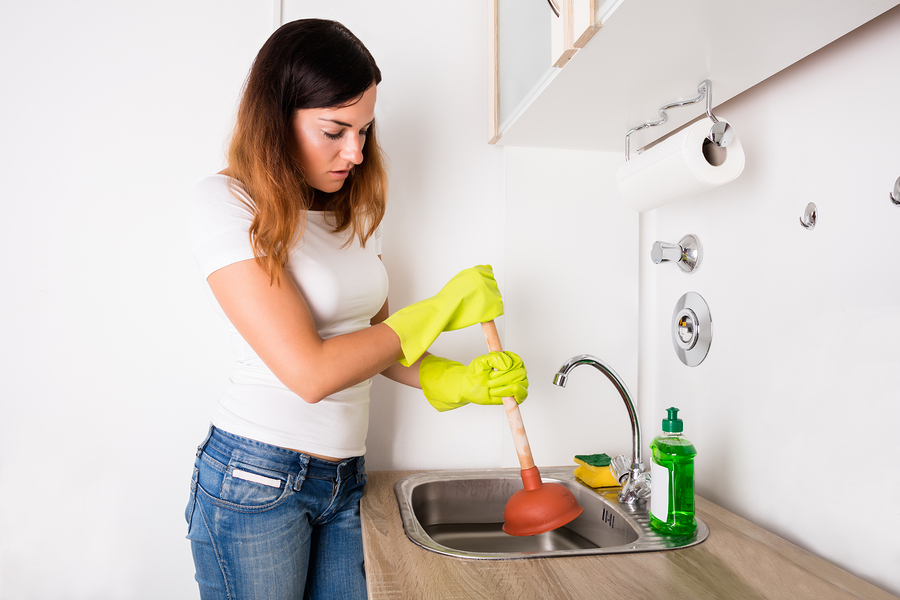Drains are possibly the last thing we think about when it comes to general house cleaning. They only really make their presence known when they’ve stopped working altogether. If you’ve started to notice water taking longer to drain or an odour coming from your bathroom or kitchen these are all early warning signs of a clogged drain.
If the water has stopped all together, then try the following blocked drain plumber approved tips, to get your pipes back in business.
Preventing a Blocked Drain
Before we get to the nitty-gritty of unclogging, let’s run through how to keep your drains working happily for the foreseeable future:
- It’s always a good rule of thumb to know what doesn’t belong in your drain. For the bathroom try to reduce the amount of hair that is washed down. For kitchens avoid any liquid fats or wheat and rice products.
- Drain catchers the answer for avoiding any solid food items or large clumps of hair. Sure they might be a little icky to clean, but it’ll beat getting the plunger out.
- Every month pour down a chemical cleaner and rinse the pipes. Remember to wear safety equipment, such as gloves and goggles when using bleach and never to mix chemicals!
- Another alternative is to chemical cleans is: running boiling water down the drain once a month.
These are some important things every homeowner should know about the drainage systems and home improvements.
Unclogging Drain Methods
The Snake Method
There are many tools available at little cost when it comes to cleaning your drains. First, there’s the barbed plastic tool. Its long bristle-like plastic works to remove hair and other blockages near the mouth of the drain.
For a deeper clean you might want to make or purchase a wire snake.
These tools are flexible and longer reaching; however, take care not to push back the slime further into your pipes. Straightening out a wire coat will get you past the drain cover and allow you to fish out any hair or other blockages. Otherwise, you can purchase a plumber’s snake at your local Bunnings.
The Plunger Method
We all know that a plunger is a go-to tool for all blockages, but if you’re wondering why then read below.
The plunging motion works to create blasts of air that is used to dislodge any hair or food stuck in your pipes. It’s important to make sure your plunger is fitted around your drain entirely and that any other points of entry are entirely covered.
If anything is left open, this will cause the pressured air to escape leaving the pipes blocked.
An alternative but similar method to plunging is to use a dry/wet vacuum on your drain. Place the nozzle over the sink and switch the blower mode off and on to blast out any blockages. Don’t leave running as it could cause damage to both your vacuum and pipes.
The Chemical Method
If these other two methods have not yielded results, then it might be time to use some good old fashion caustic soda.
Caustic soda works to eat through any blockages in your pipes.
Avoid repeated use as prolonged exposure to these chemicals will damage the pipes. Like mentioned above; great care has to be taken when using any chemicals in your home. Make sure you read and follow these procedures:
- Done full protective gear, this includes glasses, gloves and a face mask
- Work in a ventilated area
- NEVER mix your chemicals, this includes other cleaning products as well as drain cleaners
- Don’t use a plunger after inserting drain cleaner as the splash back will cause chemical burns
You can purchase these cleaners in either liquid or crystal form. Once poured into the drain they should sit for the period instructed in the manufacturer’s directions. Do not use these areas during this time.
The Household Method
If you’re looking for a drain cleaner that’s friendly on the pipes, consider trying this homemade concoction. It’s equal parts baking soda and vinegar. Usually half a cup straight into your drain. For the full effect make sure to plug the drain so the mixture can work its magic. Similarly, to the chemical cleaners, it’ll take some time. We recommend a couple of hours, before rinsing with warm, clean water.
For persistent and heavily blocked drains, emergency plumbers should be called in to take a look. There’s no telling how complex the problem may be without it being assessed by a professional. It’s always best to relay to a plumber any methods you have tried beforehand.


